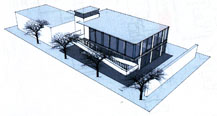 |
Architect illustration of new Xerox Building.
30 August 2012 |
Construction on a building for Xerox, which is currently housed in the UFS Sasol library, will start later this year, as soon as the budget is finalised, says Nico Janse van Rensburg of Physical Planning.
The UFS Sasol library is in the process of re-allocating existing space to make it more efficient for users. Services that are not directly associated with the library, like Xerox, will be moved to another site.
An easily accessible site near the Provisioning Building in Rector’s Avenue has been identified. The building will provide for the printing of documents, storage of documents as well as a reception desk where documents can be collected.
The design proposal also endeavours to incorporate green concepts such as passive ventilation, efficient daylight use as well as light steel building construction with higher rated insulation capacities in the brickwork.
The building is expected to be completed in March next year.